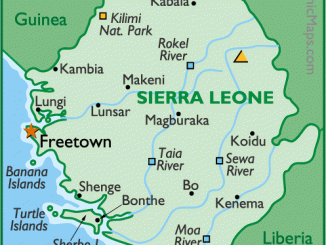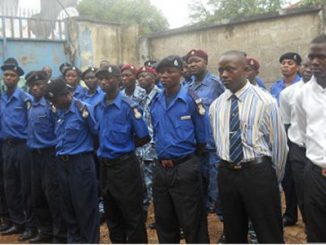
Sierra Leone bans watchdog group over damning report on deadly prison riot
Inmates at a prison in Sierra Leone. Prison authorities in the country have imposed a ban on a local watchdog group over a report on a deadly prison riot which occurred last year.
By Kemo Cham
Sierra Leone Correspondent
Prison authorities in Sierra Leone have imposed a ban on a local watchdog group over a report on a deadly prison riot which occurred last year.
The riot at the main maximum security prison, the Freetown Correctional Centre, better known by its original name as Pandemba Road Prison, has been described as the deadliest in the history of prison unrest in the country.
Prison Watch, which monitors prison conditions in the country, has not made its report public yet.
The organisation had sent a copy of the report to the prisons management for their response before publication, when it got the ban notice.

Death toll
The April 29, 2020 prison riots led to the deaths of several people. Official reports put the death toll at 30. But many human rights campaigners believe the number could be higher due to the secrecy with which the government initially handled the incident.
A spokesman for the prisons confirmed the ban on the watchdog group, noting that it was imposed “until further notice”.
Leslie Cole-Showers, the public relations officer of the Sierra Leone Correctional Services (SLCS), claimed that Prison Watch falsified its report.
“They formulated a falsified report about the April 29th incident in Pademba Road. They claimed that we buried dead bodies in the centre, after we opened our centre to a series of investigations by the CID and some human rights organisations including Prisons Watch. They could not find anything of that sort,” he said.
Actual facts
Mr Cole-Showers added that the actual facts of the incident were already in the public domain, noting that if they had fabricated the facts, relatives of the “supposed missing inmates” would have come up with complaints.
The riots attracted both local and international attention.
The government had accused opposition politicians of masterminding the unrest. But the opposition said the government staged it with the intention to assassinate a top opposition figure, former Defence minister Alfred Palo Conteh, who was at the time incarcerated in the overcrowded facility which is located in the west end of Freetown.
Conteh’s wife was charged in court for her alleged role in planning the riot.
Covid-19 fear
Both official and independent reports — including one by the global rights watchdog Amnesty International — have partly blamed the riot on the fear of Covid-19.
The prison had just recorded a case of the viral disease and prisoners were reportedly worried about lack of preventive measures at the facility which was initially built to accommodate 324 inmates but held over 1,000 prisoners at the time of the riot, according to official report.
The confirmation of a Covid-19 case at the facility led the prison authorities to impose movement restrictions, a decision that sparked angry protest by the inmates, the report revealed.
Among many other factors, the report also noted that staff shortage at the facility prevented the prison authorities from providing adequate security, leading to escalation of the violence.
Properties worth millions of Leones were destroyed, as inmates reportedly held prison wardens hostage during the riot.
Military intervention
The report claims that after the police failed to put the riot under control, the military was called in.
But while the government insist in the report that the military used “reasonable force” to control the riot, some human rights campaigners and the opposition claimed that the prisoners were shot at indiscriminately.
There were also suggestions that the presidential guard was deployed to execute the operation.
Calls for an independent judge-led investigation into what exactly happened fell on deaf ears.
Prison Watch said Wednesday it has given the prison management two weeks to respond, after which it will publish its report even without official approval.



